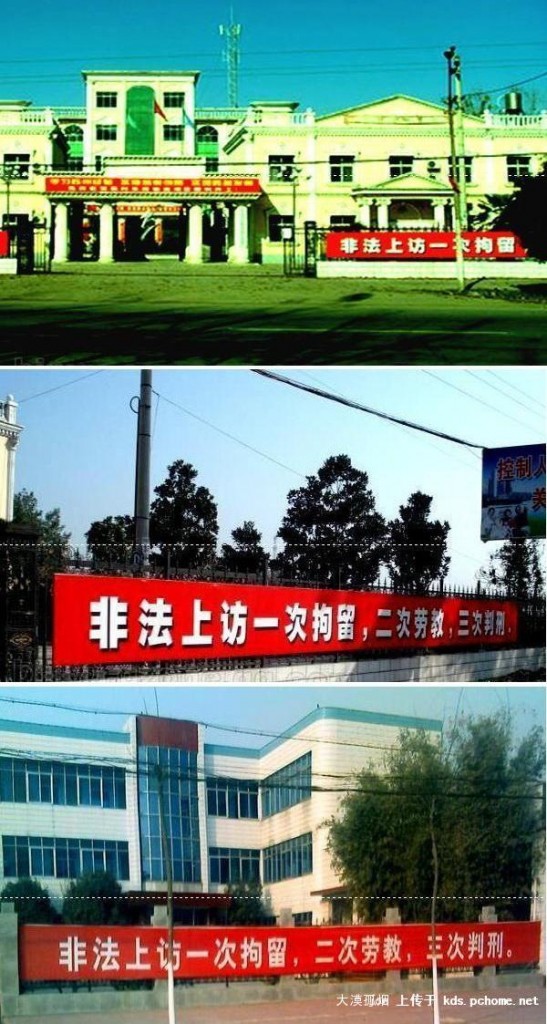The letter and visit petition system (xinfang) is an administrative system for hearing complaints and grievances from individuals in China. The state and local bureaus of letters and visits are in charge of receiving letters, calls and visits from individuals or groups. The officers then channel the issues to respective departments and monitor the progress of settlement. Many citizens start their petition journey when the local courts fail to resolve their disputes.
In August 2009, the Central Commission on Political and Legal Affairs of China issued an opinion document which encourage people to resolve their disputes by legal means and demanded local governments to intercept visit petitions to the central government. The authority is concerned about the rapidly increasing number of of petition visits to Beijing which may disrupt social stability. On 28 of September 2009, the Commission released a follow-up “Q & A on Petitions and Visits related to Litigations and Complaints” which further emphasized the importance of following the hierarchy of petitioning to local bureaus first before going to successively higher-level agencies. It also stressed the need to obey law and order during petitioning and prohibited visits to places like the Tiananmen Square, Zhongnanhai and the embassy districts.
However, the majority of netizens disagreed with the government's way of dealing with people's grievances. An online poll in a forum showed that only 8 votes in support of versus 481 against the “Q & A document” . Netizens’ comments reflected a strong distrust towards the local authorities:
高原百分百2009-09-29 11:24:34: 如果下级机构能妥善、快速解决问题,谁还愿意花精力、花钱越级上访?
高原百分百2009-09-29 11:24:34: If the lower-level agencies can deal with problems effectively and efficiently, who will waste money and efforts to petition to higher authorities?
糊涂王子2009-09-29 15:49:17: 谁愿意舍近求远哪,地方护短、推诿、愚民、不解决问题,人民群众不满意就得越级上访… 有人越级上访是你平时监管力度不够,指导不到位,对你的下级管教不严造成的,你们没责任吗?没有为人民解决问题的能力吗?如果没有趁早把你这个部门撤销了。
糊涂王子2009-09-29 15:49:17: Who will trouble themselves to complain afar? Because the local authorities excuse their mistakes, tell lies to citizens and refuse to solve problems, people have to surpass the ranks in making petitions… This shows that you (note: the top authorities) are not doing enough to monitor and supervise your subordinates. Don’t you bear any responsibility by not being tough enough to your subordinates? Do you have the ability to solve problems for the people? If not, it is time to shut down your department.
浪子杀手2009-09-29 16:09:56: 现在的官员都是上级任命的。下级的官员有问题才导致群众上访。下级与他的上级早就是关系户了。不越级能很好地解决问题吗。如果能在同级解决问题,谁又愿意花费钱财去越级呢。
浪子杀手2009-09-29 16:09:56: Officials are nowadays appointed by their immediate superiors. Most of the petitions are caused by the grassroots/local level officials. When the local level government officials are intimately related, people have to surpass the rank in order to solve their problem. If problems can be solved at a lower level, who will waste the money and appeal to higher levels?
空壳一具2009-09-29 20:05:06: 中国老百姓的善良是举世闻名的,能有一口稀饭喝就满足了。如果他们决定上访了,不用怀疑,肯定是没法活了,才走此绝路啊!如果连死的心都有了,还怕上访吗?
空壳一具2009-09-29 20:05:06: The peace-loving nature of the Chinese citizens is world-renowned. They are satisfied as long as they have breads. If they decide to petition, there is no doubt that their lives are at risk and they don’t have any alternatives! With their lives at risk, will they be afraid of petitioning to the higher authorities?
The below pictures showing banners with an official slogan on petition visits are best example to illustrate the local official's attitude. The slogan says:
非法上访一次扣留, 二次劳教, 三次判刑
First time offender of illegal petitioning to higher authority will be detained; second time offender will be re-educated through labour; and third time offender will be sentenced.

A more elaborated forum post (11 September 2009) pointed out four pitfalls about the opinions made by the Commission of Political and Legal Affairs:
其一,处理和解决问题的权利归制定错误政策的单位。试问,在我国现有的基层领导人眼中,上访告状是犯了大错,因为伤了他们的面子,这还了得。有哪—个制定和创造冤案的人会自己纠正自己的错误问题,寄希望于他们自己改正错误,只不过是一个美好的愿望罢了
Firstly, having the local officials to process and resolve those complaints is a wrong strategy. To local officials, people's petition visit to Beijing implies that they have made mistake and will make them lose faces. Will those responsible for the grievances be so righteous to correct their mistakes? Such assumption is merely wishful thinking.
其二,谁来监督问题的执行和解决
Secondly, it is an issue of which government body should be responsible for monitoring the resolution of complaints.
其三,没有对制造冤案的创造者的错案追究制度,事实上反而起到了保护伞的作用,使他们不用受到惩罚,导致他们胆大妄为。使事情不可收实,上访自然不可阻挡。在中国普通的老百姓心中,自古以来{天子总是圣明的,坏的是下面的贪官污吏},告御状成了唯一选择
Thirdly, there is no system to hold those officials responsible for people's grievances into account, which means that they can do whatever they want without being punished. When things get out of control, petitioning to the top becomes inevitable. Since ancient times, ordinary Chinese hold the view that “the emperor is always virtuous, while officials below are often corrupted.” Complaining to the emperor becomes the only choice.
其四,信访部门的批复,以及批复到什么单位、什么人,信访人根本就不清楚,收到批复的单位也不告诉信访人,导致重复、反复上访。事实是导致重复、反复上访的责任不在上访人本身,问题没有得到答复,没有得到解决,再次上访自然是必然
Fourthly, replies and actions taken by the letters and visits office are often unclear to the petitioners. Those units receiving correspondences from the letters and visits office also do not inform the petitioners. This leads to recurrence of petitioning, which is really not the responsibility of the petitioners. When complaints are not replied or solved, it is inevitable for them to complain again.







2 comments
A very Chinese, as well as poignant paradox. Every outside observer of China should know something about this. Great post, Andy!